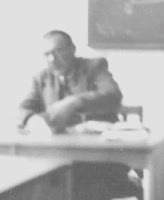 I took this rather fuzzy photograph surreptitiously from the back of the classroom when I was in the 6th Form of Kingston Grammar School back in the mid-1950s.
I took this rather fuzzy photograph surreptitiously from the back of the classroom when I was in the 6th Form of Kingston Grammar School back in the mid-1950s.Mr Cripps (or "Sir" as we were obliged to call him) was one of the finest teachers I ever encountered in the whole of my schooldays. He taught English and Latin. He was small in stature and quietly spoken and yet had an innate ability to maintain discipline. I knew of none of my classmates who would dare challenge his authority, or even say anything bad about him in private.
I was therefore saddened to learn from www.kgsintouch.com yesterday that Ken Cripps had died .. at the age of 98! I shall always remember him with affection and gratitude. Nicotine addicts will no doubt rejoice in the knowledge that Ken lived to be 98 as a regular smoker (he gave up the habit when he was 83!)
Here are few points from an obituary appearing on the website:
* * *
'Uncle' Ken Cripps, arguably Kingston Grammar School's best-loved teacher, died on October 23 at the ripe old age of 98. He taught for 27 years at KGS, finally hanging up his mortarboard in 1971, but his legend grew in his long retirement, when he kept up with scores of former pupils.
He also maintained his links with the school, becoming one of its principal benefactors. A new staff common room was named after him, to recognise his “major and enduring contribution to the school”. It features a bronze bust of Ken.
John Elvidge, chairman of the school governors, explained: “Of the many former teachers at KGS who live on in the memories of past pupils, students and parents, we do not know of anyone who is held in higher esteem by so many.”
Ken Cripps, who lived in Anglesea Road, Kingston, was born on April 27, 1909, in Horley, Sussex, where his father, the Rev Henry Cripps, had been pastor of the Baptist church since the start of the century.
After attending grammar school in Hertford, Ken went on to teacher training college, eventually joining the staff at KGS during the Second World War, where one of his early tasks was taking charge of the evacuation of pupils as Kingston – home of the Hurricane fighter plane – had become one of Hitler’s key targets.
Ken specialised in English and Latin, developing a teaching style which Bernard Pratt described as “combining a friendly, non-intimidating approach with an ability to keep order”.
However, it was his enthusiasm for overseas trips and London outings which really endeared him to pupils. Visits to West End plays gave many boys (the school was male-only in his day) their first experience of theatre.
He led annual trips to Paris for more than a decade, and took charge of an ambitious rail expedition to Leningrad and Moscow during which, in an obscure Soviet station, he left the train on which the group was travelling to buy everyone sandwiches from a snack bar, only to discover that the locomotive had left the platform without him.
He had to take an express to catch it up later in the day.
* * *
I was a self-obsessed, neurotic, depressive teenager in my final years at school, and I remember once Ken Cripps set our class the task of writing an essay about our present lives and how we saw our future. Mine was pessimistic to such a degree that Ken Cripps took the 5-mile bus ride to my home one evening and had a long conversation with my father about my state of mind. (Incidentally my life turned out very differently to the one I had foreseen in my essay.) I mention this little incident as a small example of the degree to which Ken actually cared about his pupils.
God bless you Ken.
2 comments:
Your Mr. Cripps sounds like a wonderful man. I was especially interested to read about the five mile bus ride he took so that he could speak with your dad. Amazing! Something only a "Catcher in the Rye" kind of character would do.
This is a nice "To Sir, With Love" kind of tribute you've written.
I knew Ken Cripps from my years at KGS, which I joined in the first year in 1966. Ken was a kindly and interesting man with a genuine affection for his pupils.This was in sharp contrast to many of his colleagues who had an extraordinary range of psychological difficulties which made them particularly unsuited to the teaching profession. But that's another story. By the time I was taught English by Uncle Ken, in the third year, he was a confirmed drinker and would spend his lunch hour every day in the pub. This and poor personal hygiene meant that he smelled terrible and it could be quite stomach churning to be near him. But his humanity, care for his pupils and great abilities as a teacher meant that I look back on him with fondness as someone who taught me to love literature and poetry in particular. I enjoyed reading the appreciation of him above and am astonished and glad that he lived for so long,given his extraordinary self neglect.
Post a Comment